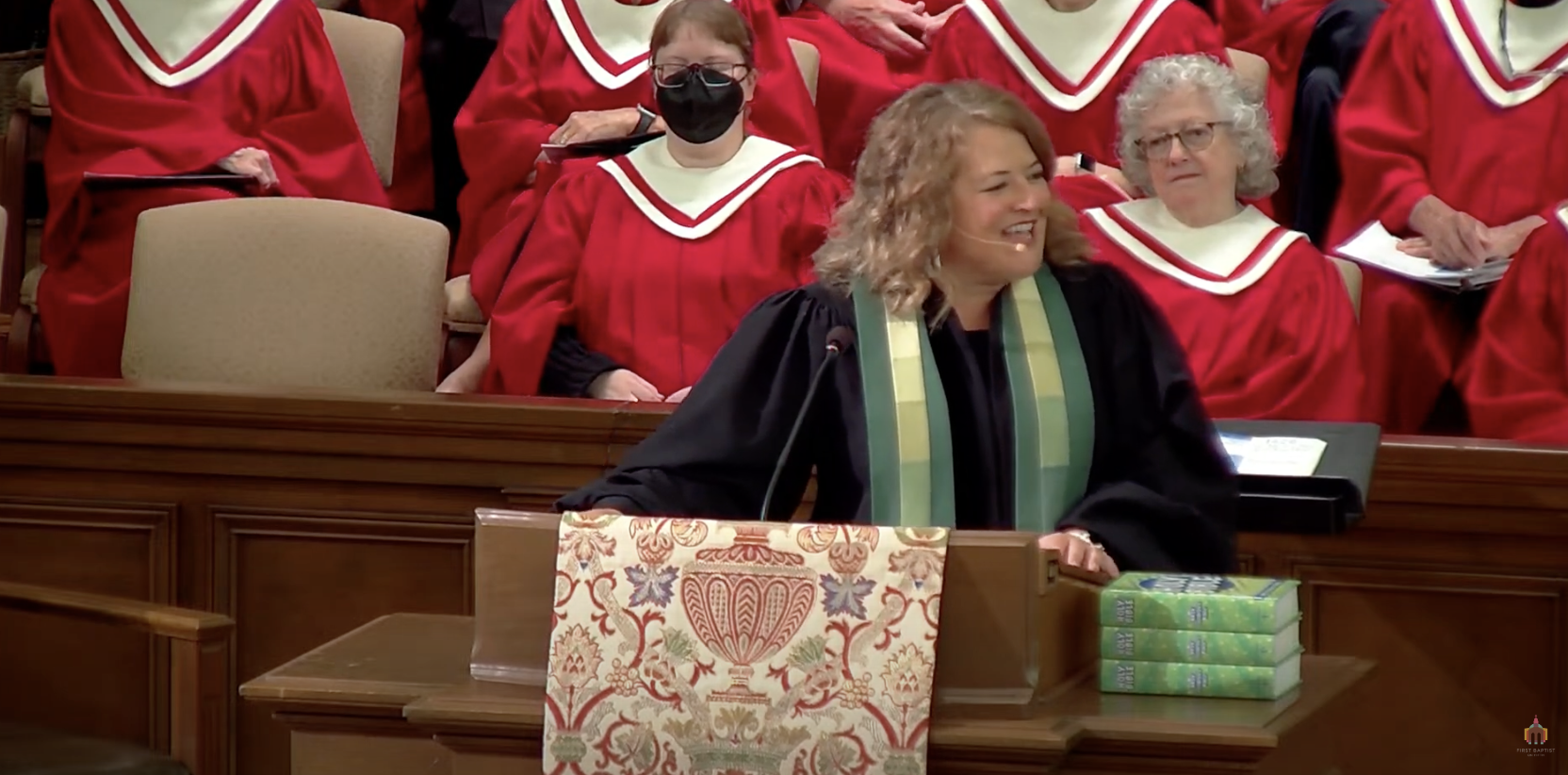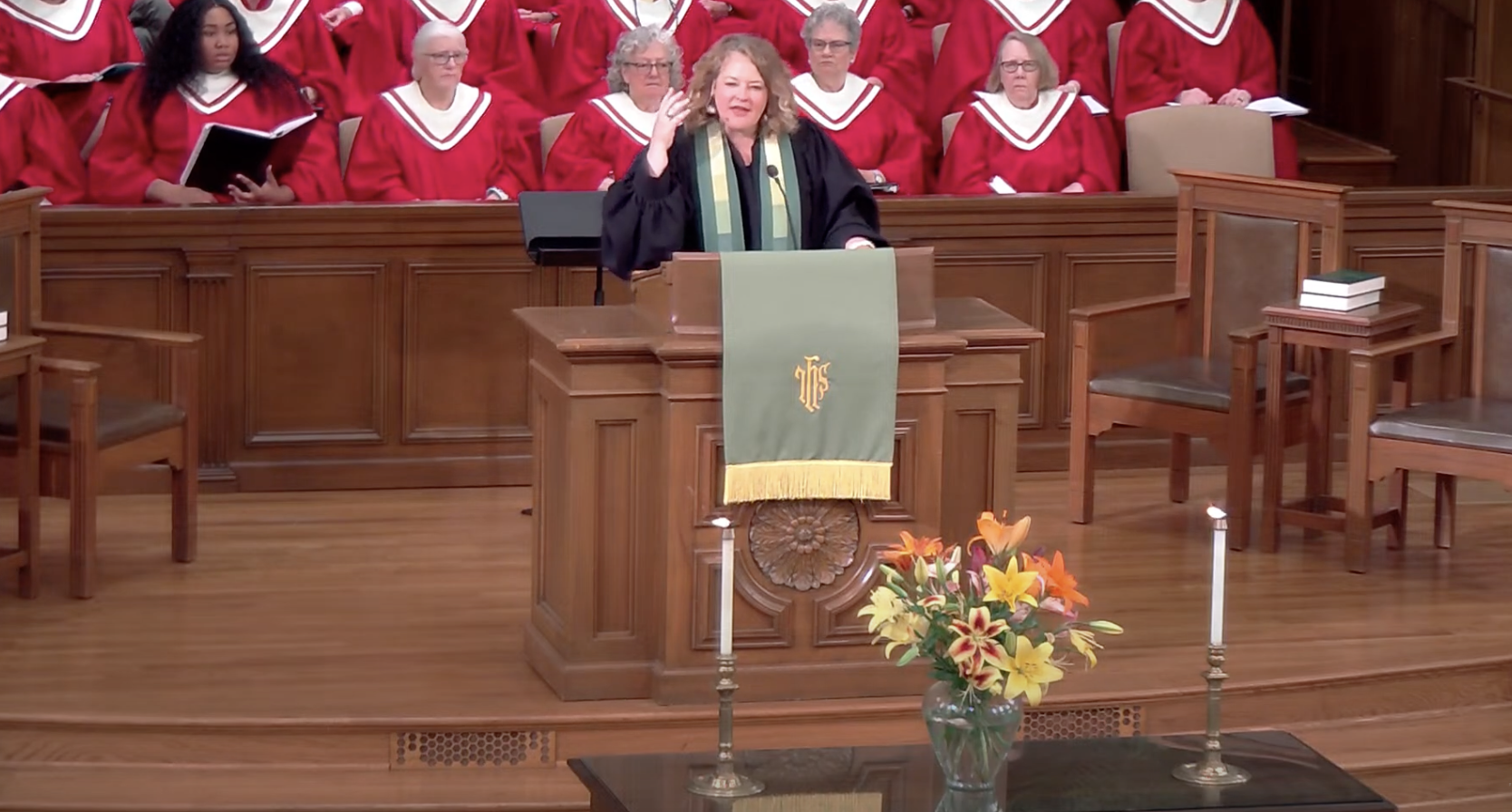I.Nearly five years ago after the pandemic had shut down so much of life as we’d known it, our family decided – like so many others – that we had to get out of the house. Home had become school and office and gym and restaurant and everything else, and we needed some wide open spaces in the thick of that pandemic winter so we wouldn’t lose our minds. “Let’s go hiking,” I remember saying to Josh, never mind that I was a complete hiking novice. He knew what he was doing, bless him, which was necessary as we piled our young kids in the car and bundled up for our first trip up Hanging Rock.
Not knowing precisely what to expect, we’d overprepared and overpacked – ok, I’d overprepared and overpacked – which meant we were later leaving Winston-Salem than planned. Which meant that after summiting the mountain in fits and starts, darkness began to shroud us on the way down. Quickly, we modern city folk who are so used to lightbulbs and street lamps and the artificial glow of electricity lit up our phone flashlights and huddled together so as to not trip and fall over the rocks we scampered down.
Cut to a few years and dozens of hikes later, and our family enjoyed an afternoon hiking with Jake and Abigail Cook and their family, over to Stone Mountain State Park. Again, our hike started later on that winter afternoon, and again, it concluded in the dark. Again, I reached for my phone’s flashlight, only to hear Abigail laughingly chide me. “Put it away!,” I remember her saying wisely. “Our eyes will adjust to the darkness. Look up!” And sure enough, she was right. Our eyes did adjust. Wouldn’t you know it, the sky was lit up that night with stars. The moon was far better a companion than any iPhone flashlight. With her encouragement, we walked with confidence instead of fear, enchantment instead of self-assurance, trusting the inherent light from a darkened sky to guide our paths. Perhaps after several hard years of learning to walk in the pandemic dark behind us, I needed the reminder that came on a clear night, and a nudge to have attentive eyes to find the light that was there all along.
II.“In a dark time,” poet Theodore Roetke writes, “the eye begins to see.”1 These words could be written about any dark time, not just a dark night on the side of a mountain. A dark time in this season, when a touch of melancholy sets in as the Christmas lights come down, and the days stay short, and you’re still the same old you in this new year. A dark night of the soul in your life, when loss is great, and your spirit is tested, and doubts loom large, and comfort is but a mirage. A dark night in the world, when the multitudes ache with violence and fear, with loneliness and isolation, with all that tears us apart from each other and from God. It was a dark night of exile that lingered for decades for the waiting community of the Israelites.
That’s who the prophet Isaiah is speaking encouragement to in our text from today. “Arise, shine,” Isaiah says, “for your light is come, and the glory of the Lord has risen upon you.” These words must have surged with energy to a people who walked in darkness. Their 70-year forced exile to Babylon had left Jerusalem bereft of so much that makes for flourishing – a community robbed of people and all the energy they pour into a particular place; resources of money, property, and intellect taken from a city; the temple reduced to ruin.
“For darkness shall cover the earth,” Isaiah continues, “and thick darkness the peoples.” For you see, when the Israelites began their return home, they wouldn’t return to the home they left, but rather the new normal that lay ahead. Things had changed. Loss and disorientation were their way of life. The darkness didn’t disappear or die.
“But the Lord will arise upon you,” Isaiah rejoices, “and the Lord’s glory will appear over you. Nations shall come to your light and kings to the brightness of your dawn.” Again after that opening refrain, we hear the phrase “your light” repeated in its deliberate ambiguity. On the one hand, the phrase “your light” refers to the Lord, Israel’s only hope for a future. On the other hand, “your light” is also referencing Israel’s own “glow,” the radiance that emanates from one firmly in another’s light, a glow in this situation that transforms Israel. And that light? God, it’s source. To us, Christ, its bearer. All of us — the world God so loved, God’s beloved children, you and me, its radiance.“Lift up your eyes and look around,” Isaiah urges. In a beautiful translation of this text, the Jewish Study Bible translates “then you shall see and be radiant; your heart shall thrill and rejoice” to “as you behold, you will glow; your heart will throb and thrill.”2 See and be radiant!, Isaiah says to his people. Behold, and you will glow.
III.I suppose now’s a good time to mention that exactly one year ago right down here, I was given this star word that said “radiate.” I confess, I took one look at it and thought, “radiate? What am I supposed to do with that? Maybe I can just slip in here on Monday morning and trade it for a better word.” Can’t say I felt particularly radiant in early January last year. I felt rather lumpy, with a holiday hangover and a desperate desire to send my kids back to school. I was channeling the many memes I’d seen online, like the one that said, “I don’t think I want a new year; could I have a vintage one instead? How about we dust off 1998 and try it again?” Radiate?, I thought. Really?
As perhaps some of you found with your star word, it took me a while to inhabit the word, to really get under the skin of it and discover what it meant for these days and weeks called 2024. I wouldn’t say I mastered it, by any stretch, but what I found changed me.
You see, upon first examination, I had assumed that to radiate meant that I was to do something at first. That I had to initiate, that I was the source of the work to find or cultivate my inner light, summon it even when I didn’t much feel like it, and, well, glow with the love of Jesus. I figured “radiate” would be just one more item on a to do list, something I should be better at or labor more diligently to accomplish. (Tell me you’re an Enneagram 3 without telling me you’re an Enneagram 3!) But on harder days this year – when money was tight, or schedules were busy, or family members got snippy with each other, or even on days when it was just dark or rainy or glum or too much – I struggled to get there. On those days I struggled, I was certain “dim” should have been my word! I wondered why didn’t I get “radiate” as my word of the year in a different year, a shinier one? I surely radiated the year I was baptized, the year I started seminary, the year I fell in love with Josh, the years I had my babies! Those were milestone years! Burning bush years! Big moments of accomplishment years, not this seemingly ordinary one in my 40s.
But what I found was that the invitation to radiate wasn’t just another task to accomplish or way to try and measure up. No one would be trying to earn their halos around here. It wasn’t an appeal just for the shiny years, like turning on a flashlight, a spotlight, a floodlight to my life at its seemingly best. Rather, I discovered that when the inner light seemed hard to summon, it was the outer light that I could more easily reflect. Often “radiate” didn’t start within me, it began outside with you. With the world around me. When I couldn’t shine, you did. Beloved community did. Neighboring did. Wonder and delight and hope that felt like stars of light in an often-darkened sky did. God revealed in Light – born, lived, died, and risen upon us did. I learned what the prophet Isaiah knew generations before and has been trying to tell us ever since: that to be radiant required you to see! Lift up your eyes and look around, he says! See and be radiant!
Once I knew, I knew! I couldn’t not see. I beheld buds in spring, and a snuggly puppy just ready for a belly rub. I noticed my son’s easy laughter, my dear friends’ unyielding companionship, my parents’ endless supply of compassion. I looked for glimmers particularly in the people and places where I might otherwise assume shadows. I gave in to astonishment and cut my teeth on wonder. I glimpsed people loving their neighbors, and caring for the oppressed, and standing for justice. I lifted my eyes instead of looking at my list and my life, and saw you in all the fullness of your living. And I couldn’t help but to see Christ, the world’s light.
Perhaps my most striking memory this year of seeing the radiance around me came at our church’s potluck picnic back in May. You remember it perhaps – the weather was just right. The tables were overflowing with your deviled eggs and potato salad and chess pie, our dishes squeezed together to make room for the abundance. There were so many of us there, we’d run out of forks! No matter: abundance was as far as my eye could see. A pile of our youth playing frisbee with the kids. New members meeting longtime members, and longtime staff welcoming new staff. Warm hugs and focused conversation. All your dazzling diversity: queer couples and babies and single seniors and dogs and college students and young retirees and big families, all bringing who you are and what you have to share in beloved community, all drawn in not just because we love our church, which we do, but because we’re all drawn in and knitted together by the liberation and grace and light and abundance of Jesus. I said this back then and again now – I sat there with my fried chicken and my spoon and tears running down my face. You, church, were positively glowing with love. You were! I remember distinctly thinking back to my star word, and had an epiphany right then and there. (It took me until May, but I got there!) The radiating I felt called to do was this! I don’t radiate on my own. None of us do, and no matter how many security lights we buy and install and use will do it for us. But see and be radiant? See you, shining like the sun? Let my eyes adjust to see pops of light breaking through whatever darkness surrounds me? Yes! Yes. All that seeing invited any radiance I had to offer. And the best way I could radiate was then to tell about it with my words, my heart, my life, my love.
IV.That’s my star word story; I’d love to hear yours. Because you may have greeted this new year thick in a particular darkness. It’s different for all of us, and we don’t always know or understand the darknesses that each other faces. I’m clueless about the darkness of living with a chronic illness or caregiving for one that does, utterly naive about the ache of raising children in a country under siege of war, unacquainted with the trauma of abuse. These lights hidden under a bushel are ones unfamiliar to me, these among the many, many others – though they may be familiar to you, your shadows shaping the contours of your life.
Some thinkers do call these our shadows, which lead to a “shadow side” or a “shadow self,” unable or unwilling to lift our eyes through them. David Whyte says “to live with our shadow is to understand how human beings live at a frontier between light and dark, and to approach the central difficulty: that there is no possibility of a lighted perfection in this life.”3 What a lure it is to deny the shadows, to avoid them or deny them or project them. What a snare it is to grab the spiritual equivalent of the iPhone flashlight or put up emotional security lights in the shadows. What a temptation it is to try and manufacture that lighted perfection and live within it.
Yet the encouragement of Isaiah is the encouragement of the God Isaiah serves. Arise and shine, for your light has come! The darkness remains, but the light that shines will not be overcome. Lift up your eyes and look around! See and be radiant! It is the witness of Abraham and Sarah called to look to all the stars in the skies to see the blessings of their descendants. It is the witness of the Magi looking to the night sky to find the star at its rising. It is the witness of the Epiphany Church insisting on being the ones whose eyes adjust to the dark in order to find the light that never leaves, the ones who “let our light shine before others so that they may see your good works and give glory to your God in heaven.”
V.When Maxie Dunnam was the Pastor of Christ United Methodist Church in Memphis, he told his congregation about a trip he’d made to the Czech Republic, the former Yugoslavia, and Hungary with a tour group of Methodists. (Sounds like a rousing good time, right?) For 45 years the huge red star of the Soviet Union had towered over the landscape from the highest tower of the Parliament buildings in one of those countries. Rev. Dunnam remembers hearing the joy in their tour guide’s voice, delighting in sharing with his tour group that the red star was gone after being taken down in the Freedom Revolution.
Later that night, the group went to a local Methodist church to worship and share fellowship. The building of that church is rather forgettable; dilapidated and deteriorating, dim and dark like so many. But its Sanctuary is in the headquarters of the old Communist Party building. And when the group entered that Sanctuary, it was completely different on the inside from the old building that surrounded it on the outside. Because when they walked in and lifted their eyes, they saw it: a huge, multi-pointed Moravian star, glowing radiant in the darkness. The red star of the Soviet Union was gone, but there in that place, among people who walked in darkness and saw a great light, another star shone brightly.4
VI.Beloved ones, no matter the star word you receive today, my prayer for you this year is to see and be radiant. Let your looking transform “the fireless life in which you find yourself.”5 Feel the invitation of “a divine luminosity that hovers over the far horizon.”6 Pray as Rabbi Abraham Joshua Heschel did, when he said, “I prayed for wonders instead of happiness, Lord, and you gave them to me.”7 Live as Madeleine L’Engle encourages in her poem called “Epiphany”: “Unclench your fists. Hold out your hands. Take mine. Let us hold each other. Thus is God’s Glory Manifest.”8
Arise, shine, dear church! For your light has come. Amen!




